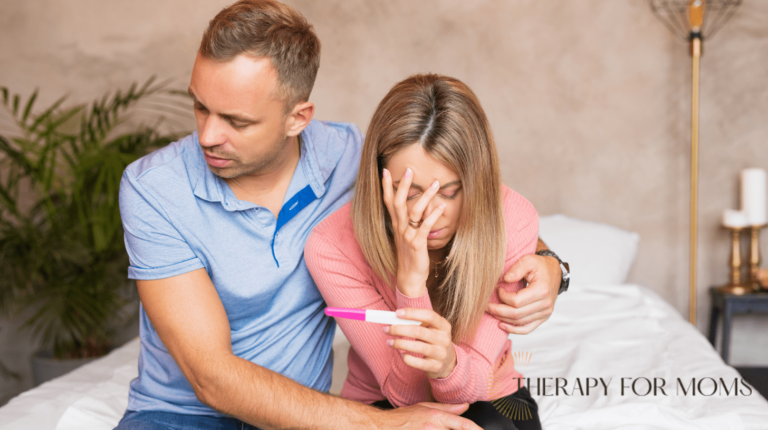
Welcoming a new life into the world should be one of the most exhilarating experiences one can have, yet it’s not uncommon to hear expectant mothers speak of experiencing an emotional rollercoaster during this time—a far cry from the idyllic glow pregnancy is often associated with. Have you ever found yourself amidst this turbulence, feeling overwhelmed by waves of unexplained sadness or apathy? You’re certainly not navigating these choppy waters alone.
Understanding what’s happening within your body and mind is crucial, as mental health during pregnancy isn’t just about well-being but potentially impacts your baby too. It’s time to shine a light on a topic that often remains overshadowed by societal expectations: depression symptoms while pregnant. This article aims to offer you guidance through these challenging times, ensuring that both you and your bundle of joy experience the healthiest start possible.

Overview of Understanding Depression During Pregnancy
Pregnancy heralds a monumental shift in a woman’s life, accompanied by profound hormonal changes, physical transformations, and emotional adjustments. With all these shifts taking place simultaneously, one might ponder the toll it takes mentally. Is it typical for expectant mothers to feel bouts of disinterest or fatigue? Is there an underlying commonality between these feelings and depression?
Is it normal to not feel like doing anything during pregnancy?
Firstly, let me put your mind at ease—feeling lethargic or disinterested at times during pregnancy is fairly standard. Your body channels incredible amounts of energy into nurturing the growing life within you which can leave little vigor for anything else. Simple daily tasks may become daunting undertakings due to physical discomfort or weariness caused by your changing body.
However, there’s a thin line where typical ‘pregnancy blues’ could signal something more concerning; consistent lack of interest might be indicative of prenatal depression.
Is it common to get depressed during pregnancy?
While discussions around postpartum depression are gaining ground, its counterpart – prenatal depression – still hovers under many people’s radar. The truth is quite stark: depression during pregnancy is more common than most realize.
According to the American Pregnancy Association, 14-23% of women struggle with some symptoms of depression in pregnancy. The stigma surrounding mental illness means that many women remain silent about their struggles—which only accentuates their sense of isolation and exacerbates depressive symptoms.
Recognizing signs early on in order to manage them effectively is paramount—for both mother and child. Let us delve deeper into understanding this condition better so we can combat the shadow cast by maternal mental illness with informed compassion and effective strategies for care and healing.

Impact of Depression While Pregnant
When navigating the journey of pregnancy, a multitude of changes occur, not just physically but emotionally too. Understanding these emotional fluctuations is crucial because depression can cast a long shadow over this otherwise joyful time.
Why can depression be harmful during pregnancy?
Depression during pregnancy, often referred to as antenatal depression, poses significant risks for both the expectant mother and her unborn child. It’s paramount to grasp that this form of depression isn’t simply a case of temporary blues; it’s a severe mood disorder that merits attention and care.
- Hormonal Turbulence: Hormone levels surge during pregnancy, potentially triggering depressive episodes. This biological shift can affect your brain chemistry and lead to persistent feelings of sadness.
- Stress Management: Pregnancy should be a period of preparation and anticipation. However, when you’re dealing with depression, stress becomes harder to manage, undermining your ability to look forward to motherhood.
These points underscore why it’s so important to address depression: when left unchecked, it can disrupt sleep patterns, appetite, and even prenatal bonding—all contributing factors that may hinder your ability to care for yourself and your growing baby adequately.
What are the risks of feeling depressed during pregnancy?
Embarking on the path toward parenthood ought to be safe and secure. Yet if depression enters the picture:
- Prenatal Care Neglect: You might find yourself less likely to attend scheduled doctor appointments or follow medical advice—a cornerstone for healthy fetal development.
- Nutrition Deficit: With an altered state of mind comes possible neglect in maintaining a balanced diet critical for prenatal nutrition—key vitamins might be missed which are crucial for baby’s growth.
- Increased Substance Use: There’s an increased risk you may turn to substances such as tobacco or alcohol as coping mechanisms—a decision fraught with perilous outcomes for newborns.
The effect of depression in pregnancy reaches beyond birth too—it may lead directly into postpartum depression, casting another layer of challenges into early motherhood.
How does depression during pregnancy affect the baby?
Shining light on how maternal mental health impacts infants is vital; after all, effects of depression on pregnancy aren’t confined solely within—and they certainly don’t vanish at birth.
- Cognitive Development Concerns: Research indicates that sustained maternal stress hormones like cortisol can cross the placental barrier affecting the cognitive development and temperament of the child.
- Premature Birth Risks: Studies suggest there could be higher instances of preterm delivery among mothers grappling with antenatal depression.
- Future Health Issues: Ongoing research delves into whether children born from stressful pregnancies have greater susceptibilities to physical ailments later in life.
Bound by these observations is an imperative narrative: being vigilant about my mental well-being during pregnancy isn’t purely self-serving—it strikes at the heart of setting up generations yet unborn onto paths flourishing with potential.
Supporting your emotional landscape throughout this transformative chapter isn’t a sign of weakness—it’s a profound act of love for oneself and one’s future child. Recognizing warning signs opens doors towards timely intervention enabling healthier horizons—for both you as an expecting mother and equally importantly—the new life beginning its journey within you.

Pregnancy Depression Symptoms
Pregnancy can be a rollercoaster of emotions. Along with the joy of expecting a new life, some women experience more serious mood changes that can indicate depression. It’s vital for both your health and the baby’s well-being to recognize these symptoms early on.
What are the symptoms of mental illness in pregnancy?
Depression during pregnancy isn’t always easy to identify because some symptoms such as changing sleeping patterns or varying appetite might simply seem like part of the pregnancy journey. However, there are certain signs that may suggest a deeper issue:
- Persistent Sadness: Feelings that linger beyond occasional mood swings.
- Loss of Interest: A noticeable disinterest in activities once enjoyed.
- Guilt or Worthlessness: Negative thoughts about oneself affecting self-esteem.
- Energy Changes: This could be excessive fatigue despite adequate rest.
- Concentration Problems: Trouble focusing or making decisions could be common.
- Appetite Disturbance: Significant increase or decrease without medical cause.
- Anxiety: Elevated levels beyond typical worries of impending motherhood.
Recognizing these symptoms is the first step; however, many tend to normalize them as ‘just part of being pregnant’. If you’re experiencing several at once or if they’re severe enough to interfere with daily life, it’s crucial to seek professional help.
Coping with emotional distress isn’t always straightforward while anticipating a child’s arrival. It’s important to hold onto hope, knowing that help is available and effective. So let’s now consider how confronting this depression head-on can not only manage it but also potentially improve outcomes for both mother and baby.

Confronting My Depression
Entering motherhood is a journey sprinkled with an array of emotions, and feeling sad during pregnancy can be part of that emotional spectrum. But when does this sadness become something more serious? Let’s delve into understanding these feelings and what actions to take.
Can I ignore it?
In short, no. Ignoring persistent sadness or symptoms of depression in the hopes they will simply vanish can be detrimental. Pregnancy is a pivotal period when both your mental and physical well-being are crucial not only for you but also for the healthy development of your baby. Untreated depression may lead to adverse outcomes such as poor nutrition, drinking alcohol, smoking, missing prenatal visits, and potential complications during birth.
Consider depression like any other medical condition that needs attention; it doesn’t necessarily dissipate without support or treatment. Not every bad day will warrant alarm, but if you’re finding bleak moods are your constant companion, it’s time to step forward for help.
How to confront depression during pregnancy?
Confronting depression means acknowledging its presence and taking proactive steps toward managing it:
- Acknowledge Your Feelings: Be honest with yourself about how you’re feeling. Brushing off concerns may lead to bigger issues down the line.
- Speak Up: This isn’t a path you should walk alone. Talk to your healthcare provider about any negative emotions you’re experiencing. They’ve heard it before and are there to help.
- Seek Support: Lean on trusted friends and family members when possible–their support can be invaluable.
- Stay Active: Simple activities like walking or prenatal yoga can boost endorphins which may improve mood.
- Practice Mindfulness: Methods such as meditation or breathing exercises can alleviate stress and anxiety associated with pregnancy.
Turning these strategies into regular habits might not cure depression overnight. However, over time they contribute positively by providing structure, release from tension, and a network of support—all important factors in regaining control over your mental health.
Contact Therapy For Moms
If handling things on your own becomes too heavy a burden or you feel your daily functioning slipping away under the weight of depression or postpartum depression —reach out for professional help specifically designed with mothers in mind.
Therapy For Moms is a tailored therapeutic approach focusing on the unique challenges faced by expectant women dealing with mood disturbances:
- Individualized Care: Each mom’s experience is different hence personalized therapy sessions catered toward individual needs promise better outcomes.
- Expert Guidance: Trained professionals adept at navigating the complexities of emotion during pregnancy are both comforting and effective guides through difficult times.
- Accessible Resources: By tapping into specialized services intended for soon-to-be moms grappling with depression encourages healing within an empathetic environment.
Such resources could make a world of difference when battling emotional hurdles throughout this vital phase in life where peak wellness is paramount—for both the parent-to-be and baby on board.

